
views
Mopping Your Floor
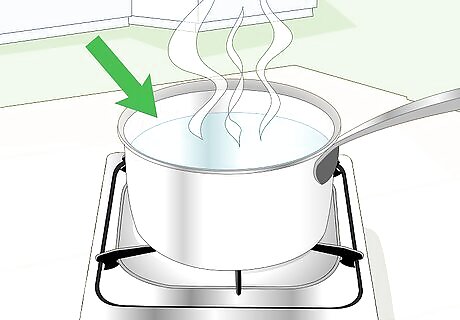
Use hot water. Whether you are creating a solution to wash your floor, or just using water, you should use hot water. Hot water will help cut through grime. Ultimately, by using hot water, you’ll decrease the chance that you’ll need tougher solvents that could damage the marble. EXPERT TIP Michelle Driscoll, MPH Michelle Driscoll, MPH Founder, Mulberry Maids Michelle Driscoll is the Owner of Mulberry Maids, which is based in Fort Collins, Colorado. With five years of experience, her business specializes in cleaning homes and small offices. She holds a Masters in Public Health from the Colorado School of Public Health. Additionally, Mulberry Maids has an A+ rating from the Better Business Bureau. Michelle Driscoll, MPH Michelle Driscoll, MPH Founder, Mulberry Maids Michelle Driscoll, a cleaning expert, recommends: "When cleaning marble, be sure to stay away from harsh chemicals, like bleach, ammonia, hydrogen peroxide, and vinegar. Use a pH-neutral soap diluted in hot water to mop the floors. Then, dry the marble with a soft rag rather than allowing it to air-dry."
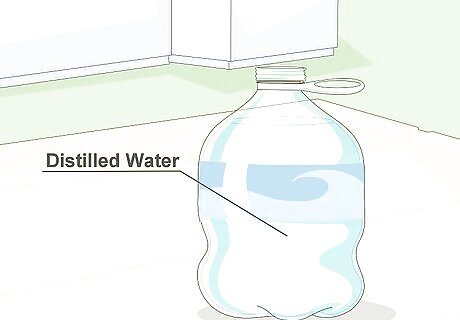
Focus on distilled water. Distilled water is water that has gone through a process to remove minerals and other impurities. By using distilled water, you’ll reduce the chance of discoloring or staining your marble. You can buy distilled water at just about any grocery store or box store. It is usually cheap.
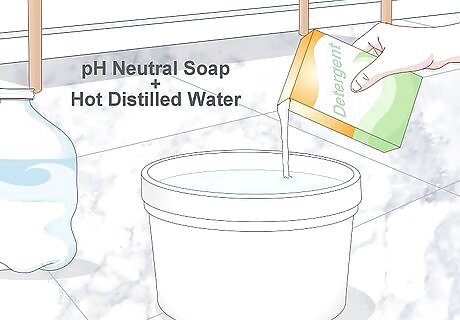
Add a mild detergent to your water. Add a mild detergent such as 2-3 drops of dish soap into a bucket with your hot, distilled water. Follow the directions of the soap and dilute it with an appropriate amount of water. Mix your solution thoroughly. Make sure to only add pH neutral soap to your water. Harsh chemical solutions like bleach, hydrogen peroxide, ammonia, and vinegar can be damaging to your floors. Avoid using these on marble. If you prefer, you may be able to use a commercially prepared marble cleaner. Simply follow the directions on the bottle and then clean as you would with a water and detergent solution. Some products include Stone Tech, Resolve, or Simple Green.
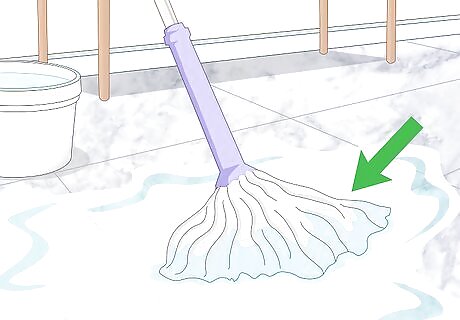
Use a soft mop on your floor. Take a mop with a soft mop head (preferably microfiber) and dip it into your solution of detergent and water. Wring out the mop head to relieve it of excess water and systematically mop your floor. Do short strokes that overlap. Rinse and wring out the mop head after you’ve covered 10 to 20 square feet (1 to 2 square meters). This might vary depending on how dirty the floor is.
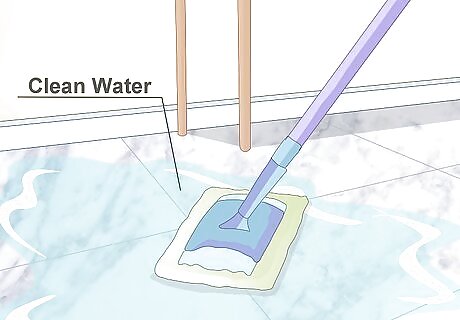
Mop the floor again with clean water. After you’ve mopped your floor with a detergent solution, you should mop it again with cool clean water. By mopping it again, you’ll help pick up any dirt or debris that remains on the floor. In addition, you’ll remove any suds that remain on the floor.
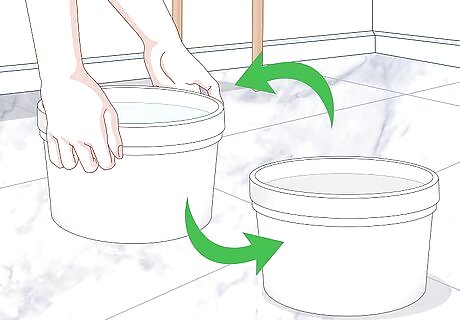
Change your water frequently. When mopping your floors, you need to make sure you change the cleaning solution or water often. If you don’t, your floor might become streaky or could be scratched by debris in the mopping water. If your water appears brown or you see it full of dirt, dump it. Refill it with new water (and soap, if you want).
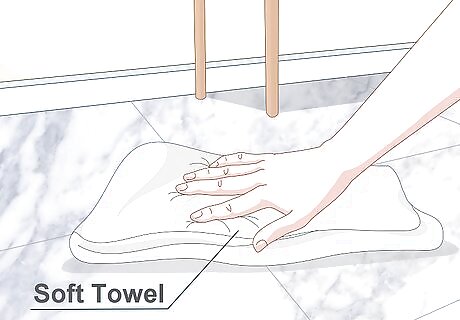
Use a soft towel to dry the floor. Since marble is relatively porous, it’s important to sop up as much of your cleaning solution or water as you possibly can. If you don’t, the solution could leech into the marble and discolor it. Switch out wet and dirty towels as needed.
Avoiding Damage to Your Floor
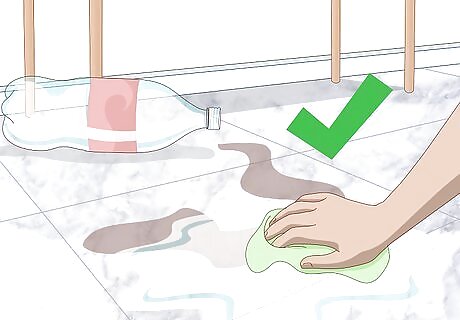
Wash your floor immediately after a spill. All spills on marble should be cleaned up immediately. This is because marble is a porous material and can absorb spills. If you let something sit too long, your marble will discolor or stain. Take a wet microfiber cloth and use it to blot up anything you’ve spilled on the marble floor.
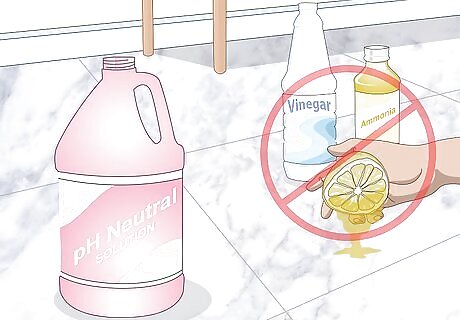
Use pH neutral solution. pH neutral cleaners won’t damage marble floors. As a result, stay away from acidic cleaners. They might scratch or hurt the shine of marble floors. Avoid: Vinegar Ammonia Citrus cleaners (like lemon or orange). Cleaners intended for ceramic floors.
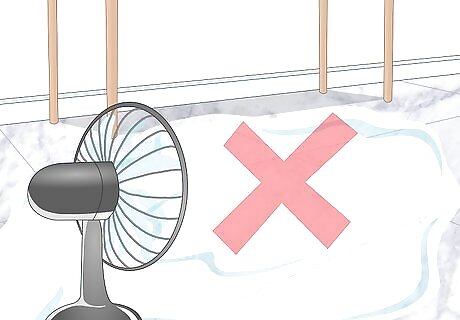
Do not let your floor air dry. One of the worst things you can do to your floor is to let it air dry. By letting it air dry, you’ll allow the water/solution to soak into the marble. This could stain or discolor the marble.
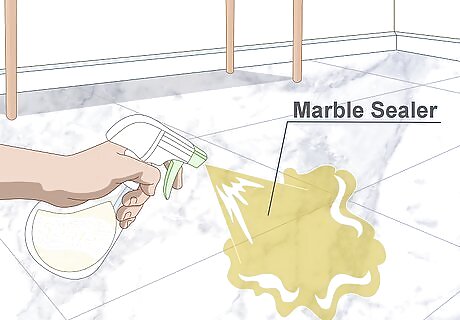
Seal your marble. The best way to limit staining on your floor is to seal your marble periodically. Locate a sealing product specifically formulated for marble. Read the directions and apply the seal onto the surface of the marble. Depending on the product (and use), you may have to reseal every three to five years. Make sure to protect other surfaces, such as wood, tile, or grout, with plastic or painters tape. Contact a professional if you are uncomfortable sealing your marble floors by yourself.
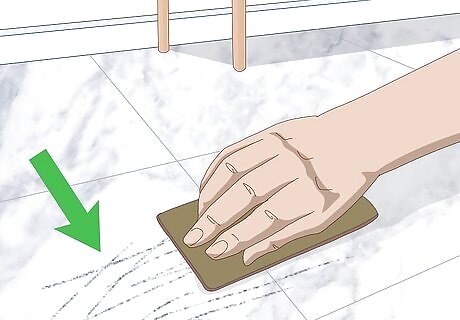
Use a felt pad to remove scuff marks. When you come across a scuff or other mark that won’t come off during a normal washing, use a felt pad to remove it. Simply dab the pad in a mixture of detergent and water and rub the marble gently along its grain. Do not rub in a circular pattern. This will damage your marble.
Sweep and mop your floors regularly. Regularly removing dirt and debris from your marble floors will help prevent future scratching and scuffing. How often you clean your floors will depend on how frequently they get dirty. Aim to remove debris as you notice it. If, for example, you have children or pets that easily track in dirt, you may need to sweep your floor a few times a week as opposed to once a week.
Put down rugs to protect your floors. Area rugs and floor runners can help protect your marble floors, especially in high-traffic areas. Use area rugs in places like the living room and rug runners in hallways to prevent scuffing and scratching. Adding a no-slip pad under your rugs will help further protect your floors and keep your rugs in place.
Removing Debris from the Floor
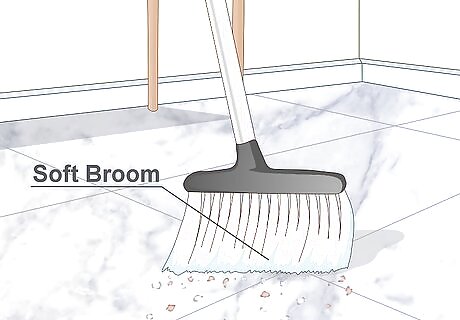
Sweep the floor with a soft broom. Take a soft dust mop or a broom with soft bristles and sweep the floor. Make sure to sweep up as much debris as you can. Pay special attention to areas along walls or doors.
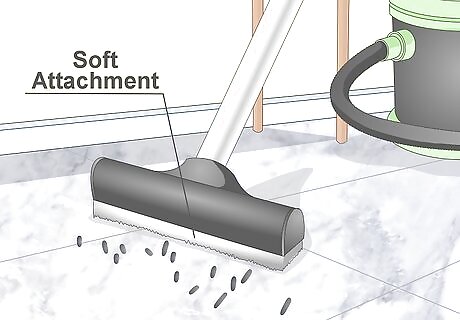
Be careful using a vacuum. If you choose to use a vacuum, you need to be careful not to damage your marble floor. The plastic on the nozzle or wheels of a vacuum can etch or scratch marble. As a result, use caution if you decide to use a vacuum If you have a central vacuum system in your home, you may be able to use a soft floor attachment on the nozzle. However, you should test the attachment in an inconspicuous area (such as behind a door) before using it.
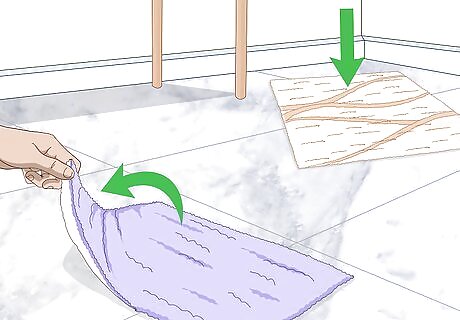
Use rugs and mats throughout your home. Rugs and mats will help accumulate debris. As a result, sweeping or vacuuming your floor will be easy. In addition, rugs or mats will protect high traffic areas from scratches.




















Comments
0 comment